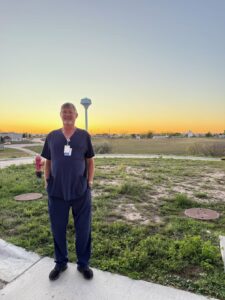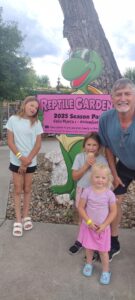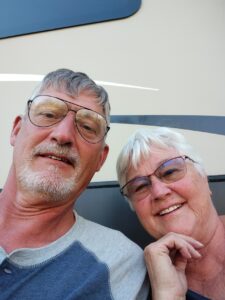Today we talk to a veteran nurse highly praised by his leadership. “Joe is always helping wherever we need it,” says nurse supervisor Katie Schindler. “If we are short an MSA, he will go up front and work the window; if the outpatient clinic is short, he will go over and help them if asked. He always has a positive attitude and has a wealth of knowledge that we often use as a resource.”
Hi Joe! Let’s start with your start: how did you get into nursing?
I received my associate of Nursing degree from Oglala Lakota College of Nursing. When I was a senior in high school, I took an emergency medical technicians’ course that my local Volunteer Fire Department offered in Hemingford Nebraska. I got on the Volunteer Fire Department there and helped my community during my senior year of high school.
When I went to college, I wanted to be a paramedic. But way back in the 80s, there just weren’t really good paying jobs for paramedics back then. It was all volunteer fire departments and ambulance services. So I did the next best thing and received my associate degree in nursing from Oglala Lakota College in Pine Ridge SD. I was the first male nurse to graduate from the nursing program. My first year as a new grad, I worked at Chadron Community Hospital. I had previously done some nurse’s aide work at Chadron Community Hospital for three or four years through college.
I’ve pretty much been a nurse my whole life.

You must have had a lot of interesting experiences at this point in your career.
Yes, I did. I don’t know if you want to call it a blessing or not, but how I found out about getting a job and working for the Pine Ridge Hospital happened when I was actually on an ambulance run. We were dispatched to assist a tribal ambulance at the airport in Chadron. There was a critical trauma patient that coded and tragically died when the nurse pilot and ambulance driver loaded him on the airplane to fly him to Denver. We worked tirelessly to save the young man who had been stabbed.
Afterward, I mentioned to the nurse that I was a new grad nurse. She told me how to apply in Pine Ridge. So I did and got the job in the ER at Pine Ridge.
When I started working there, the government only staffed 2 nurses on day shift, 2 nurses on night shift and 1 mid-shift nurse, with 1 MSE to sign people in. There was 1 doctor on day shift, 1 on night shift, and one Physician Assistant that worked from 11 am to 11 pm.
In comparison, because of Tribal Health seeing the need to greatly improve emergency care on the reservation, today we have two doctors on day shift, 2 doctors on night shift, 1 mid-level on days, 1 on mid-shift, and 1 mid-level at night. Not to mention that we try to have on at least 8 nurses per 12-hour shift and ancillary staff.
So how did you connect with Tribal Health?
I worked 36 years for the government mostly at Pine Ridge Hospital. I worked pretty much about 30 years for them in the emergency department and also, I worked the surgery ward for a couple of years at Pine Ridge Hospital and I worked as supervisor of the acute care ward for like a year.
When I retired from Pine Ridge Hospital, I had 36 years and so I retired. I was around when Tribal Health originally got the contract. I had known John, the owner of Tribal Health, from way back when they first came and looked at the site and decided to put a contract in on Pine Ridge Hospital. And so John and I knew each other and he told me one day if I ever decided to quit working for the government that he would like to see me apply to Tribal Health. So after I quit working for the government, I went ahead and applied.
So two years ago I got hired to work at the Emergency Department back in Pine Ridge. I’ve really enjoyed working for Tribal Health.

And what’s your favorite part about working on Indigenous lands?
So I would say that my most favorite part is that over the years working at Pine Ridge, I’ve met a lot of families, a lot of people. They know me. I know them. There’s nothing more rewarding than you being able to help a family member when they are experiencing a traumatic injury or illness. Later they come back to you. It might be a day, it might be a year, but they’ll come back. They’re always very appreciative of the care that you’ve given their family members. They’ll come back and give you a hug. They’ll shake your hand. They’ll tell you, I remember you and you’ve helped my mom. You helped me. You saved my life.
Just getting the sheer thank you from patients has been my reward for working at Pine Ridge Indian Health Services.
That sounds wonderful.
I believe that Tribal Health strives to meet the expectations of the people every day. It’s not just a job; Tribal Health is making a difference. Every one of the providers I’ve worked with, all the nursing staff I work with, every one of them, their hearts are into their job.
Pine Ridge is not an easy Emergency Department to work at. So it’s challenging for a lot of nurses and providers, you know.
Yes, I’ve heard that.
They might work there three or four or five months and decide that it’s just not their cup of tea. But the majority of them that do stick around – I think they find something rewarding there and they decide that they want to stay and they want to make a difference and that’s what they do.
What are your plans for the future? Do you think you’re going to stay there?
Yes, I probably will stay at Pine Ridge as long as they’ll have me.
I probably do plan on retiring. You know when it’s time to move on. I still feel like I make a difference at Pine Ridge. But working in the Emergency Department is a young man’s game. You’re on your feet all day long. At 65, I can feel the hurt at the end of my 12-hour shifts. I probably will retire from nursing in the next couple of years or if something else comes up that is not quite as demanding, I might take that challenge on as a role.
But I do love working for Tribal Health. They’ve given me opportunity and I really appreciate that.
Since you’ve been there such a long time, I feel like you must kind of act as a mentor toward newer nurses. Is that true?
Yes, I do. I always try. Anytime a new nurse comes on, I try to be very welcoming to them. I want them to feel at home when they’re struggling. Especially when it comes to the everyday stressors of the ER at Pine Ridge, I like to give them some encouragement to keep working and keep striving. And to help them to get through their difficulties.
You can’t do the job at Pine Ridge without having some trials and tribulation, you know. It’s best to be a leader and go out and try to help those young nurses. Tribal Health is truly a family that surrounds their employees.

What do you do when you’re off the clock?
So I have three children. When I’m off duty, I’m traveling between Casper, Wyoming, Sentinel Buttes, North Dakota, and Rapid City, South Dakota. I spend most of my time traveling between those towns and visiting my grandkids.
My wife Pam and I do like to travel, so we spend a lot of our time just traveling here and there. We’ve never done a cruise before, so we took a cruise to Alaska recently in May. That was the first time we ever went out of the United States because we stretched our wings out a little bit and went to Canada. It was very nice. The world is truly a beautiful place.
That sounds beautiful.
I would just say that I’ve been very grateful. I’ve had a blessed nursing career and I got to be the nurse that I am today because some other nurses took the time to teach me and I’m very grateful for their time and their patience that they had with me. I hope that I’ve returned that favor. I strive every day to meet those expectations.
Thank you, Joe!

